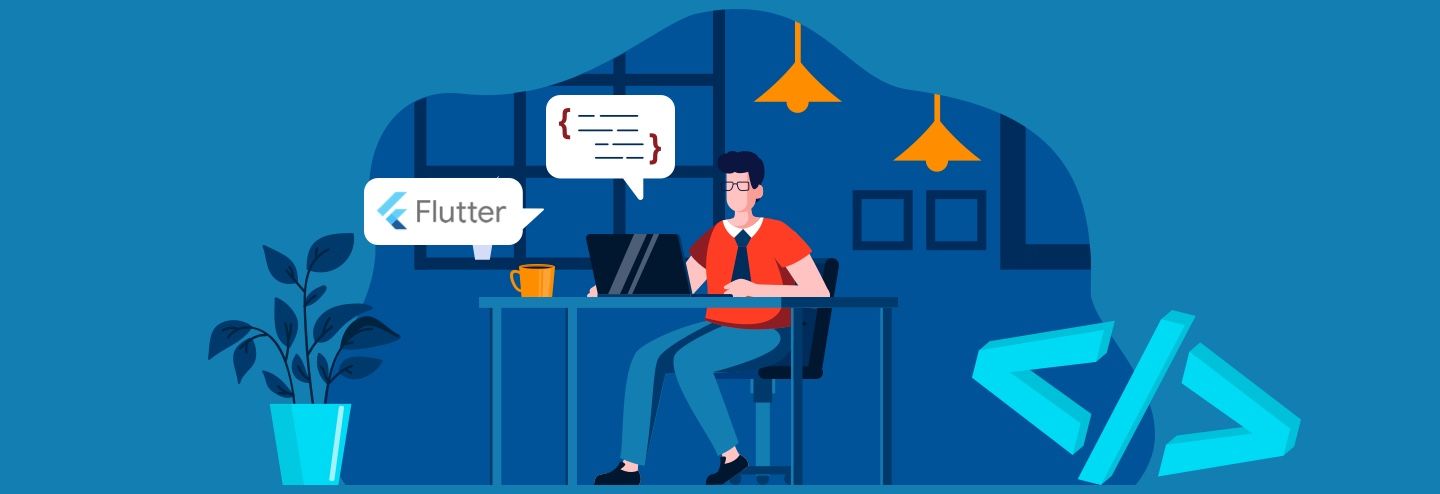At the time when Flutter entered the cross-platform app development space, React Native app development had already marked itself as the leader of the space which helped businesses make a multi-platform presence. This led to several months of low adoption rate dry spells. But then came a remarkable change in the life cycle of Flutter.
The moment Hamilton, Groupon, etc. added the software development kit to their tech stack, people started noticing the platform and the benefits it offered them over React Nativ.
As a result of the constant demand that the platform started witnessing from there on, Flutter app development started going on a continuous feature betterment mode in its 4 years of existence. The outcome of this constant improvement has been that Flutter’s features are now compared against React Native’s and they are more or less the only two players in the race to the top.
In this article, we are going to dive into the many benefits that Flutter app development services and what makes it the up-and-coming leader in the cross-platform app development space.
Let us get right into the elements that make Flutter a go-to platform for startups and established brands and the many ways it provides answers to React Native’s challenges.

Top Benefits of Using Flutter for Cross-Platform Application Development
1. Same business logic and UI across platforms
We are taught to believe that cross-platform tools come with the ability to build multi-platform applications with a single codebase. But there is no platform that makes sharing of UI codebase among platforms other than Flutter.
Let us explain this better by taking React Native’s example. This is how you render UI across platforms in React Native –
This is a complicated process.
Now what Flutter does is this –
It does not call for any platform-specific UI component to render the UI. The only thing Flutter needs is to show the app UI a canvas to draw on. By enabling sharing of both business logic and UI, Flutter developers are able to solve time and efforts with minimal to zero impact on the app performance.
However, finding the right flutter app developer is challenging as their expertise may differ from your expectations. Hire flutter app developers with us to unlock a whole package of opportunities while developing seamless applications.
2. Fast code writing process
There are two ways through which Flutter ensures a heightened speed of the code creation process – Hot Reload and the presence of Ready-to-use Widgets. Let us look into both of them.
Hot reload: Android and iOS developers first write a code, then wait for them to compile and get loaded in the devices before they are able to see any changes. Flutter, however, comes with a hot reload feature that checks the effects of the changes immediately without any wait.
Ready to use widgets: Flutter is known for its extensive widget library. The library is constantly updated with all the latest icons and design systems supported by Material Design and Cupertino. This means, no matter which platform you are looking at, Flutter will have to provision to make your application native to it.
3. Lowered time-to-market speed
The time it takes for a flutter app development company to build an app on the platform is two times faster than what it would take an Android or ios app development company. Right from hot reload to the use of platform-specific widgets and the use of its own rendering engine, there is a lot that developers can benefit from when it comes to building an application at scale and at speed.
All of this doesn’t just lower the effort that a developer has to make but also drastically brings down the go-to-market time thus giving businesses the ability to enjoy a competitive advantage.
4. Presence of advanced tooling, language, and extension
This pointer here is majorly for flutter app developers only. There are several tech stacks that make Flutter a great choice for the developers in the space –
- Pub – the robust plugin manager is included in the default toolchain and comes with a massive library of plugins present in the pub. dev plugin repository.
- Dart language – it is the language all the Flutter apps are programmed in. It is extremely easy to get started with even for someone who is just getting started in the coding domain.
- Creating plugins – the framework comes with the ability to make it easy for the developers to create plugins. So any time they feel they need access to a platform feature for which a plugin doesn’t already exist, they can code it.
5. Massive community & documentation support
If there is something that Google aces at, it would be the presence of a massive community of developers backing every product it launches and descriptive documentation and Flutter is no different. It comes with 85,000+ stars on Github and a huge following has made its way to developers who meet constantly through Google-held events and meetups.
Besides the community support, when you look into the documentation that backs Flutter, you will find it to be a lot easier to study and follow compared to what Facebook-backed React Native app development consists of.
6. Truly cross-platform
After multiple upgrades and betterments, Flutter has today reached a stage where it is no more limited to smartphones. Today, developers can use the framework to build desktop apps, web apps, wearable devices, and a lot more.
This means that irrespective of which platform your users are on, the investment in Flutter app development can get you there. This, in itself, is something that stands Flutter apart from a number of other platforms in the hybrid and cross-platform development space.
Now that we have looked into the many elements that give Flutter a competitive edge, there are some things that we want you to know.
The growth rate of Flutter app development is truly remarkable and your business can exponentially avail a lot of benefits by including the Flutter framework in your tech stack. However, when we compare the performance of a Flutter app and a Native one, the latter will win. So, while Flutter apps can be a great choice for building simplified apps, if your business model calls for a technical digital product that has new-gen technologies integrated into it, your best choice would be to go with Native application development.
Although Choosing a React Native app development company requires utmost attention and thorough field knowledge, our best bet is to collect every piece of information before getting in touch with the top companies for seamless integration of your first-ever app.
Either way, we can help you with both. Contact our team of business analyst experts to schedule a business understanding call, today.
Also read: Why should you choose Flutter for your next app project










Leave a Comment
Your email address will not be published. Required fields are marked *